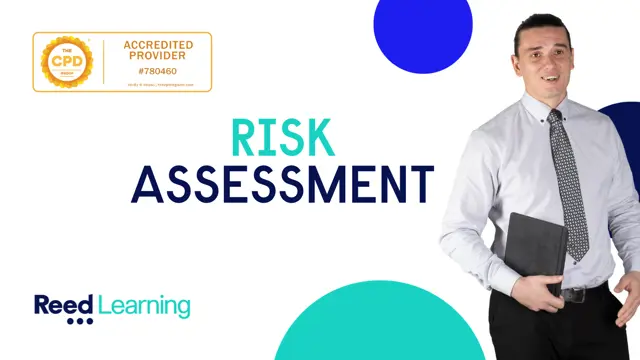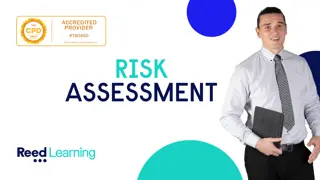
Risk Assessment - Virtual Professional Training Course
Risk Assessment - Virtual Professional Training Course
Reed Learning
Summary
- Tutor is available to students
Add to basket or enquire
Overview
This virtual course is designed to provide participants with the knowledge and skills necessary to conduct effective risk assessments in various contexts. Participants will explore key concepts, methodologies, and practical strategies to identify, evaluate, and manage risks in virtual environments.
Description
Topics Covered in the Course:
Introduction to Risk Assessment:
- Defining risk assessment and its importance in decision-making.
- Understanding the role of risk assessment in maintaining a safe and secure environment.
Legal and Regulatory Framework:
- Exploring the legal and regulatory aspects of risk assessment.
- Ensuring compliance with relevant legislation and guidelines.
Roles and Responsibilities in Risk Assessment:
- Clarifying the roles and responsibilities of individuals involved in risk assessment.
- Understanding the collective responsibility in creating a risk-aware culture.
Identifying and Categorizing Risks:
- Techniques for identifying and categorizing potential risks.
- Recognizing the diversity of risks in different organizational contexts.
Risk Assessment Methodologies:
- Introducing various risk assessment methodologies.
- Selecting appropriate methodologies based on the nature of the risk.
Quantitative and Qualitative Risk Assessment:
- Differentiating between quantitative and qualitative risk assessment.
- Choosing the most suitable approach for specific risk scenarios.
Risk Evaluation and Prioritization:
- Developing criteria for evaluating and prioritizing risks.
- Establishing risk tolerance levels within the organization.
Risk Mitigation and Control Measures:
- Developing strategies for mitigating identified risks.
- Implementing effective control measures to minimize risk impact.
Communication of Risks:
- Communicating risks transparently and effectively.
- Creating awareness among stakeholders about potential risks.
Scenario Planning and Contingency Measures:
- Utilizing scenario planning for anticipating and preparing for potential risks.
- Developing contingency measures to respond to unforeseen events.
Who is this course for?
This virtual course is suitable for groups of 4 or more professionals involved in risk management and decision-making processes. It is designed for individuals in various roles, including managers, supervisors, and team leaders across different industries.
By the end of this course, participants will have gained the knowledge and skills required to conduct effective risk assessments, implement mitigation strategies, and contribute to creating a risk-aware culture within their organizations. They will have a personalized action plan to apply risk assessment principles in their specific professional contexts.
Requirements
This virtual course is suitable for groups of 4 or more.
Questions and answers
Reviews
Currently there are no reviews for this course. Be the first to leave a review.
Legal information
This course is advertised on reed.co.uk by the Course Provider, whose terms and conditions apply. Purchases are made directly from the Course Provider, and as such, content and materials are supplied by the Course Provider directly. Reed is acting as agent and not reseller in relation to this course. Reed's only responsibility is to facilitate your payment for the course. It is your responsibility to review and agree to the Course Provider's terms and conditions and satisfy yourself as to the suitability of the course you intend to purchase. Reed will not have any responsibility for the content of the course and/or associated materials.


